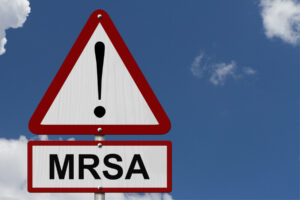Many caregivers, hospital workers, and family members of seniors receiving care at home have heard of the term MRSA, but what is it, how is it spread, and what should you do if your loved one has it?

What is MRSA?
MRSA stands for methicillin-resistant Staphylococcus aureus, an infection caused by a type of staph bacteria that has become resistant to many of the antibiotics used to treat ordinary staph infections.
To start, let’s talk about what ordinary staph is. Staph, a shortened name for Staphylococcus, is a group of more than 30 types of bacteria, with Staphylococcus aureus being the one that causes most infections such as food poisoning, pneumonia, sepsis, endocarditis, and skin infections.
How is it spread?
Most infections of MRSA are healthcare-associated, which means that they are acquired after people have been in hospitals or other health care environments, like dialysis centers and nursing homes. Most often, MRSA is found to be acquired after invasive procedures like surgery, IV tubing, or artificial joint replacement.
MRSA can also affect healthy people in the general population; it usually begins as a skin boil and can be spread by skin to skin contact, which is known as community-associated MRSA.
Contact with infected individuals or items carrying the bacteria, either by touch or by sharing personal items such as towels, for example, can spread the infection.
Who can get it?
Anyone can acquire MRSA, but your risk increases in places crowded with people and skin to skin contact or the sharing of items or equipment. People with open wounds are more susceptible to infection as abrasions or incisions are often the site of a MRSA infection. Patients at hospitals and those who have medical devices inserted into their bodies are also at higher risk of developing a MRSA infection.
How is it treated?
Treatment for MRSA will vary depending on the type of infection, the location, and the severity, as well as which antibiotics will respond to the specific strain, but can include antimicrobial therapy, pus drainage, wound care management, and medications prescribed by a doctor.
Can it be prevented?
There are steps that your senior and their caregivers can take to prevent the spread of bacteria including MRSA.
- Keep all wounds covered with clean, dry bandages and gauze.
- Laundry items should be properly disinfected.
- Make sure that everyone in the house is thoroughly washing their hands throughout the day. Have your senior’s caregivers remind them often and supervise them to be sure that they are using proper handwashing techniques.
- Make sure your senior does not pick at or pop any sores, as pus can contain MRSA.
- Do not share items such as towels, blankets, razors, or clothing.
- Immediately throw used bandages, gauze, and tape in the trash after use.
If you or your senior’s caregivers notice any swollen, painful bumps or sores that may be warm to the touch or filled with pus, make an appointment with their health care provider as soon as possible to get them checked for MRSA.
If you or a family member are in need of hiring a Caregiver in Coconut Creek, FL, call the caring professionals at Star Multi Care today at (954) 870-4770. Providing service in Boca Raton, West Palm Beach, Delray Beach, Boynton Beach, Weston, Southwest Ranches, Pembroke Pines, Cooper City, Lighthouse Point, and Wilton Manors.
Source:
Mayoclinic.org
Medlineplus.gov
Cdc.gov
Medicalnewstoday.com
- Why Personal Care Needs are Important for Independence - May 5, 2025
- Managing Migraines in the Elderly - April 30, 2025
- Honoring Our Team: Birthdays, Anniversaries, and New Additions! - April 28, 2025

